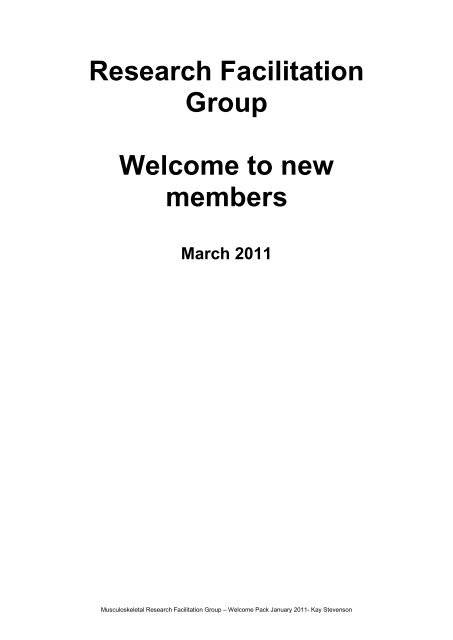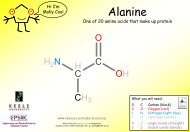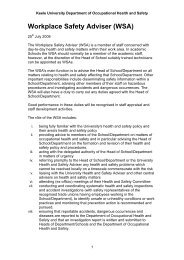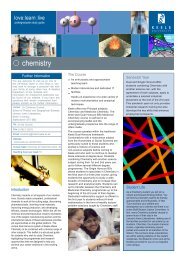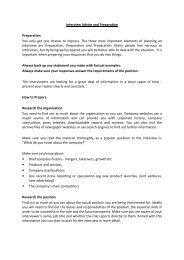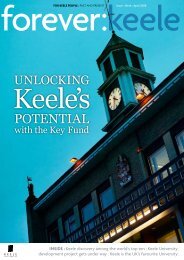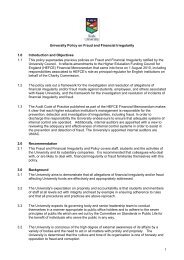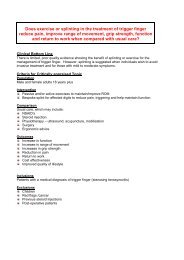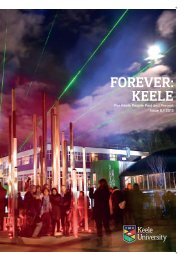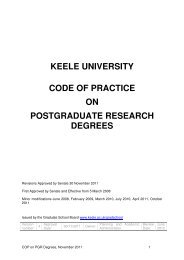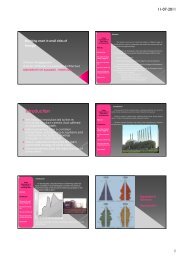Welcome Pack - Keele University
Welcome Pack - Keele University
Welcome Pack - Keele University
You also want an ePaper? Increase the reach of your titles
YUMPU automatically turns print PDFs into web optimized ePapers that Google loves.
Research Facilitation<br />
Group<br />
<strong>Welcome</strong> to new<br />
members<br />
March 2011<br />
Musculoskeletal Research Facilitation Group – <strong>Welcome</strong> <strong>Pack</strong> January 2011- Kay Stevenson
Content<br />
Aims of the group and your commitment<br />
What‟s in it for you?<br />
Group membership and professional background<br />
Useful web sites<br />
Example of Critically Appraised Topic<br />
Example of minutes of a typical meting<br />
Testimonials from group members<br />
Generating CAT questions: a proforma to encourage questions<br />
Top Tips on how to lead a CAT question<br />
The Next Steps<br />
Reflection on the CAT process<br />
Musculoskeletal Research Facilitation Group – <strong>Welcome</strong> <strong>Pack</strong> January 2011- Kay Stevenson
Aims of the group and your commitment<br />
Our aim is to ensure that clinical practice is based on the best available<br />
evidence and encourage change in practice where necessary.<br />
The Research Facilitation Group is a group clinicians and clinical researchers<br />
that are interested in musculoskeletal disease. The professions represented<br />
are:<br />
Nursing<br />
Occupational Therapy<br />
Podiatry<br />
Physiotherapy<br />
Clinical Researchers<br />
Health Information Librarians<br />
Psychologists<br />
Therapy Managers<br />
The group is supported by Arthritis Research UK Primary Care Centre,<br />
<strong>University</strong> Hospital of North Staffordshire, Stoke PCT, North Staffs PCT and<br />
Central and Eastern Cheshire Primary Care Trust.<br />
Our aims are to:<br />
Ensure clinical practice is evidence based and assist practice change<br />
where required<br />
Increase the research awareness of staff involved in managing patients<br />
with musculoskeletal disease<br />
Search the evidence for relevant up to date clinical recommendations<br />
and then feed this back to staff in clinical practice<br />
Identify gaps in the evidence<br />
Link with our academic partners to develop research proposals<br />
Increase our research awareness skills<br />
Publicise and communicate our results<br />
Your commitment<br />
The group meets four times a year at three monthly intervals. Meetings are<br />
held at Arthritis Research UK Primary Care Centre, <strong>Keele</strong> <strong>University</strong> and last<br />
3 hours, normally 9-12. Coffee and refreshments are provided.<br />
You will be required to attend the meeting and commit to appraising articles in<br />
between the meetings. This would amount to no more than 2 hours per<br />
month. We would hope you would cascade useful information to your team<br />
within your own area of practice and highlight the work of the group. We<br />
would also ask that you canvas opinion on future questions that are important<br />
for us to answer<br />
Musculoskeletal Research Facilitation Group – <strong>Welcome</strong> <strong>Pack</strong> January 2011- Kay Stevenson
What’s in it for you<br />
Some of the benefits of being involved in such a group include:<br />
Supportive environment to answer important clinical questions<br />
Engage with a multi professional group who are interested in<br />
musculoskeletal disease<br />
Opportunities to engage with an established research unit<br />
Opportunity to learn about research methodology and research design<br />
from experienced researchers<br />
Musculoskeletal Research Facilitation Group – <strong>Welcome</strong> <strong>Pack</strong> January 2011- Kay Stevenson
Group membership and professional background<br />
Caroline Amphlett Physiotherapist<br />
Kenneth Aaron<br />
Physiotherapist<br />
Hilary Bradbury<br />
Physiotherapist<br />
Robert Bradshaw-Hilditch Podiatrist<br />
Robert Bryan<br />
Clinical manager<br />
Linda Chesterton Physiotherapist and researcher<br />
Jemma Cowen<br />
Systematic reviewer<br />
Carol Doyle<br />
Physiotherapist and researcher<br />
Krysia Dziedzic<br />
Prof. of Musculoskeletal Therapies<br />
Sharron Edwards Podiatrist<br />
Carol Grahame<br />
Occupational Therapist<br />
Andrew Finney<br />
Nurse and researcher<br />
Deborah Fernyhough Occupational Therapist<br />
Nadine Foster<br />
Prof. of Musculoskeletal Health in Primary Care<br />
Noeleen Hellis<br />
Clinical manager and physiotherapist<br />
Jo Hill<br />
Occupational Therapist<br />
Mathew Hill<br />
Podiatrist<br />
Jonathan Hill<br />
Physiotherapist and researcher<br />
Sue Hill<br />
Psychologist and researcher<br />
Lucy Huckfield<br />
Physiotherapist and researcher<br />
Triana Larkin<br />
Physiotherapist and researcher<br />
Rachel Lewis<br />
Health technology Librarian<br />
Liz mason<br />
Physiotherapist and researcher<br />
Alison Morris<br />
Physiotherapist<br />
Sue Jackson<br />
Physiotherapist<br />
Jo Jordan<br />
Systematic Reviewer<br />
Kika Konstantinou Physiotherapist and researcher<br />
Mark Porcheret<br />
General Practitioner<br />
Panos Sarigiovannis Physiotherapist and clinical manager<br />
Julie Shufflebotham Physiotherapist and researcher<br />
Kay Stevenson<br />
Physiotherapist<br />
Gail Sowden<br />
Physiotherapist and researcher<br />
Cath Thwaites<br />
Nurse<br />
Amanda Walters Physiotherapist<br />
Elaine Wiltshire<br />
Physiotherapist<br />
Musculoskeletal Research Facilitation Group – <strong>Welcome</strong> <strong>Pack</strong> January 2011- Kay Stevenson
Useful web sites<br />
Critical Skills Appraisal Programme<br />
http://www.phru.nhs.uk/Pages/PHD/CASP.htm<br />
CASP appraisal tools<br />
http://www.phru.nhs.uk/Pages/PHD/resources.htm<br />
McMaster <strong>University</strong> Evidence Based Practice Centre<br />
http://hiru.mcmaster.ca/epc/<br />
National library for Health<br />
http://www.library.nhs.uk/Default.aspx<br />
Clinical Knowledge Summaries<br />
http://cks.library.nhs.uk/home<br />
Pub Med<br />
http://www.ncbi.nlm.nih.gov/pubmed/<br />
<strong>University</strong> Hospital of North Staffordshire<br />
http://www.uhns.nhs.uk/home.aspx<br />
Haywood Hospital<br />
http://www.haywoodrheumatology.org.uk/<br />
Musculoskeletal Research Facilitation Group – <strong>Welcome</strong> <strong>Pack</strong> January 2011- Kay Stevenson
Example of a Critically Appraised topic<br />
In adults with shoulder joint impingement is the intervention of stabilization<br />
exercises and/or postural correction versus any treatment or no intervention<br />
effective in reducing pain and increasing function?<br />
Clinical bottom line<br />
There was no evidence specific to scapula stabilization exercises, but the general<br />
summary of the literature searched was that an exercise programme was beneficial<br />
with the addition of manual therapy being more effective than exercises alone<br />
Population:<br />
Male and female adults<br />
Intervention:<br />
Scapula stabilization exercises / postural correction<br />
Outcome:<br />
Reduced pain and increased function<br />
Excluded:<br />
Diagnoses other than shoulder impingement syndrome<br />
Databases Searched: Cochrane, Pedro, NHS Library for Health, medline, Cinahl,<br />
Embase, Psyclnfo, Clinical Evidence, Bandolier, NELH, Professional websites,<br />
Guidelines, NICE<br />
Search for the past 10 years i.e. 1996 – 2006<br />
Key words searched:<br />
Shoulder impingement, shoulder impingement syndrome, subacromial impingement,<br />
shoulder pain, tendonitis rehabilitation, exercises, exercise therapy, physical therapy,<br />
physiotherapy, conservative treatment, postural exercises, scapular stabilization<br />
Types of studies<br />
Systematic reviews, RCT‟s and guidelines<br />
Available Evidence<br />
Database ( Specific to our CAT) Number of abstracts Number of relevant<br />
abstracts<br />
Clinical evidence<br />
0<br />
PsychInfo<br />
158 2<br />
AMED/ CINAHL/ Embase<br />
3 1<br />
PEDRO<br />
27 2<br />
Medline<br />
4 3<br />
Cochrane<br />
Guidelines 1 1<br />
Total 193 9<br />
Musculoskeletal Research Facilitation Group – <strong>Welcome</strong> <strong>Pack</strong> January 2011- Kay Stevenson
Results:<br />
There were no studies directly assessing scapular stabilization / postural correction<br />
exercises. The main systematic review (Faber et al 2006) looked at the treatment of<br />
impingement syndrome. They found 94 articles, 3 of which studied exercise<br />
interventions (Brox 1999, Bang 2000, Ludewig 2003).<br />
These articles were reviewed in more detail – generally small sample sizes (eg. n=40<br />
per group), and some issues relating to blinding and validity of outcome measures.<br />
All studies presented a positive outcome for patients undergoing an exercise<br />
programme.<br />
The summary from the CSP shoulder guidelines (2004) on impingement syndrome<br />
recommend<br />
A programme of exercises to restore range, strength, stability and<br />
scapulohumeral rhythm is beneficial – based on weak evidence from clinical<br />
trials<br />
Passive mobilization of the upper quadrant augments the beneficial effects of<br />
exercise, reducing pain and increasing range, strength and function – based<br />
on weak evidence from clinical trials<br />
Scapula stability when performing strengthening exercises is „paramount‟<br />
based on clinical experience, opinion and committee reports<br />
Implications for practice:<br />
There is no evidence to suggest that inclusion of scapula stabilization exercises<br />
provide additional benefit to outcome for patients with shoulder impingement<br />
syndrome. However, an exercise programme that includes strengthening exercises<br />
+/- manual therapy is of benefit to patients with shoulder impingement syndrome.<br />
Further research question<br />
In adults with shoulder impingement syndrome, does the inclusion of scapular<br />
stabilisation/postural correction exercises provide additional benefit over a usual<br />
exercise programme in terms of pain relief and functional improvement?<br />
References:<br />
Bang and Deyle 2000 Comparison of supervised exercise with and without manual physical therapy<br />
for patients with shoulder impingement syndrome (SIS)<br />
J Ortho Sports & Phys Ther 30:3 126-137<br />
Brox et al 1999 Arthroscopic surgery versus supervised exercises in patients with rotator cuff disease (stage II SIS): A prospective<br />
randomized controlled study in 125 patients with a 2.5 year follow-up<br />
J Shoulder and Elbow Surgery 8: 2 102-111<br />
CSP 2004 evidence based clinical guidelines for the diagnosis, assessment and physiotherapy management for<br />
shoulder impingement syndrome<br />
Desmeules F et al 2003 Therapeutic exercise and orthopedic manual therapy for impingement syndrome: a<br />
systematic review<br />
Clinical Journal of Sport Medicine May; 13(3):176-182<br />
Faber et al 2006 Treatment of impingement syndrome: a systematic review of the effects on functional limitations and<br />
return to work Journal of Occupational Rehabilitation Mar; 16(1):7-25<br />
Ludewig and Borstad 2003 Effects of a home exercise programme on shoulder pain and functional<br />
status in construction workers<br />
Occup Environ Med 60 841-849<br />
Michener et al 2004Effectiveness of rehabilitation for patients with Subacromial impingement syndrome: a systematic<br />
review<br />
Journal of Hand Therapy Apr-Jun; 17(2):152-164<br />
Musculoskeletal Research Facilitation Group – <strong>Welcome</strong> <strong>Pack</strong> January 2011- Kay Stevenson
Example of minutes of a typical meeting<br />
Present<br />
Musculoskeletal Research Facilitation Group- 13 th January 2010<br />
Minutes<br />
Alison Morris, Kay Stevenson, Jo-ann Hill, Rachel Lewis, Lucy Huckfield, Nadine Foster,<br />
Mathew Hill, Liz Mason, Mathew Hill, Jonathan Hill, Jo Jordan<br />
Apologies<br />
Carol Graham, Sue Jackson, Gail Sowden, Duncan Kett, Julie Shufflebotham, Panos<br />
Sarigiovannis, Caroline Amphlett, Sue Hill, Jemma Cowen<br />
Review actions from last meeting<br />
Update new members pack and send to all<br />
Comments taken from group, now to go on web site<br />
Update the proforma to generate Qs<br />
Comments taken on proforma, distribute to all<br />
Comments on web site<br />
Update Cats according to table included<br />
See below<br />
KS<br />
KS<br />
KS<br />
All<br />
All<br />
<strong>Welcome</strong> to Lucy Huckfield. Lucy had a split post between the centre and Stoke PCT.<br />
There are to be 5 similar posts in local PCTs. Trina Larkin appointed to South Staffs<br />
post.<br />
Update on new web site<br />
http://www.keele.ac.uk/research/pchs/pcmrc/EBP/index.htm<br />
Photographs to be added.<br />
We all discussed how accessible the web site is Lucy kindly investigated this for us.<br />
Results are:<br />
Access the CAT site by using different words through google search engine. I used the<br />
following words/ phrases and this is what I came up with......<br />
1) CAT group <strong>Keele</strong> - This brought a link up that took you straight to the new MRF<br />
group website page on the CAT bank page (where the person is that you can click on to<br />
see the CAT for different areas). CAT group <strong>Keele</strong> was the top search link on google.<br />
2) <strong>Keele</strong> CAT group - was as number (1)<br />
3) CAT <strong>Keele</strong> - This was the third item on the google searched items list. The link<br />
took you to the <strong>Keele</strong> Primary Care Sciences website to the dissemination page with the<br />
list of the CATs<br />
4) <strong>Keele</strong> CAT - This was the second item on the google searched items list. This link<br />
took you to the dissemination page as in number (3).<br />
Musculoskeletal Research Facilitation Group – <strong>Welcome</strong> <strong>Pack</strong> January 2011- Kay Stevenson
Training ideas/issues for next 4 meetings<br />
All<br />
13 th Jan-<br />
14 th April - Critical appraisal- homework to be sent to all<br />
14 th July - Statistics<br />
20 th Oct - Systematic reviews (Jo Jordan)<br />
Suggested future topics: observational studies, Cohort studies, Cost analysis<br />
Feedback from EBP group<br />
KD<br />
KD gave update on EBP group ( Krysia, Mark Porcheret, Jo Jordan and Kay Stevenson).<br />
Organised very successful event on NICE guidelines to promote debate. Next evening may<br />
well be on OA.<br />
Rhian and Kay met recently with local commissioners to outline the work of the centre and<br />
EBP groups. We discussed how we can integrate evidence into practice.<br />
Stoke PCT have a GRIP group- getting research into practice, KD involved with the group.<br />
Update on current CAT work- reviews<br />
CAT for review<br />
Is multidisciplinary management of chronic low<br />
back pain more effective in terms of reducing pain,<br />
improving function and increasing return to work<br />
compared with uni-disciplinary treatment.<br />
Is one off management versus a course of<br />
treatment more effective in terms of reducing pain<br />
and function for patients over 50 years old with<br />
osteoarthritis of the knee joint<br />
Examine the effectiveness of rehabilitation<br />
programmes in primary flexor tendon repairs<br />
following surgical reconstruction at 12 weeks and<br />
12 months in terms of pain, disability, function,<br />
return to work<br />
In adult humans with peripheral musculoskeletal<br />
injury (who have not had previous repair) is the<br />
length of time of sustained active or passive<br />
stretching more effective than other aspects of<br />
stretching for increasing return to work function and<br />
activity.<br />
Does appointment duration for musculoskeletal<br />
outpatient physiotherapy or occupational therapy in<br />
primary or secondary care settings, have an effect<br />
on managerial, clinical or patient outcomes<br />
Group<br />
Noeleen, Nadine, Jonathan<br />
Present at next meeting<br />
Krysia Kay Andrew<br />
No new evidence to add to<br />
existing CAT, updated Cat on web<br />
site<br />
Carol, Debbie and Jo<br />
Present at next meeting<br />
Linda and Richard<br />
Present at next meeting<br />
Carol and Kay<br />
No new evidence to add to existing<br />
CAT, updated Cat on web site<br />
Musculoskeletal Research Facilitation Group – <strong>Welcome</strong> <strong>Pack</strong> January 2011- Kay Stevenson
Update on current CAT work<br />
CAT for review<br />
Access to healthcare practitioners<br />
Carol Jonathan, Panos, Carol, Krysia, Duncan,<br />
Carol, Andre, Sue<br />
GH joint capsulitis<br />
Caroline Nadine, Kay, Jemma<br />
Comment<br />
Completed, now on web site<br />
Completed now on website<br />
May be taken forward to the centre for<br />
funding application<br />
CAT and quick and dirty process came<br />
up with same answer.?? Should we<br />
write this up for publication?<br />
Therapists involved in requesting investigations<br />
Amanda, Kay Sue, Matt<br />
Is an exercise regime in addition to routine<br />
mobilisation / gait re-ed of improved benefit to<br />
function / QOL in post operative adult THR's?<br />
Jo Hill, Alison, KD and KS<br />
Whether a urinalysis that is positive with Nitrites<br />
and Leucocytes is sufficient evidence to not give a<br />
soft tissue/intra articular injection.<br />
Andrew Finney and the nursing group, Kyrsia,<br />
Jo<br />
TNS and the management of post op pain<br />
Alison and Linda<br />
Completed, now on website<br />
To be presented at next meeting<br />
To be presented at next meeting<br />
To be presented at next meeting<br />
Web site of interest identified by Nadine re self referal pilot projects<br />
> http://www.dh.gov.uk/en/Publicationsandstatistics/Publications/Publica<br />
Feedback on quick and dirty searches<br />
o Shoulder capsulitis- as above<br />
o Multidisciplinary referral- not undertaken<br />
New questions from Clinicians<br />
CAT for review<br />
Use of Splint in neurologically compromised patient with<br />
ankle fractures ( Vick Terry)<br />
Weight bearing/ mobilisation on day 0 for patient with<br />
total hip or knee replacement ( Alison Morris)<br />
Group<br />
Lucy, Kay Caroline<br />
Alison, Jo Liz<br />
Musculoskeletal Research Facilitation Group – <strong>Welcome</strong> <strong>Pack</strong> January 2011- Kay Stevenson
Does lack of sleep cause reduction in serotonin and can lack of serotonin have physical manifestations<br />
Corinna Dennison, Physiotherapist band 7,Burslem HC 425702 – Need clarification – Lucy to do this<br />
Feedback on shoulder and hand trial<br />
Shoulder trial at final protocol stage, hoping to go for ethics in March, recruiting in June. Will<br />
be undertaken at 2 main sites.<br />
Hand trial in last 6 months of the study. 85% follow up at 6 months, analysis to begin in the<br />
summer.<br />
Update on nursing link<br />
Andrew providing a clear lead for the nursing group, decided on question concerning joint<br />
injections and the value of urinalysis.<br />
AOB<br />
o<br />
o<br />
o<br />
o<br />
o<br />
Present work of the group to local ARMA group<br />
Discussed the need to provide patient friendly information, our information<br />
aimed primarily at clinical staff. Could ask the Research user group (RUG)<br />
group to look at existing Cats<br />
WCPT pre event training session- do we want to develop one?<br />
Gail and Jonathan leading local Outcome measures group. Have put together<br />
a proforma for those considering undertaking audit<br />
DUETS- data base of uncertainty of treatments, hosted by the James Lind<br />
alliance. WE could send out unanswered questions to this site. Funding<br />
bodies look at the site to inform call for research. Jo Jordan involved through<br />
the work of the arc. Could this be a link on our web site<br />
http://www.lindalliance.org/<br />
Actions for next meeting<br />
New members pack on web site<br />
KS<br />
Critical appraisal training sent info to all:<br />
BMJ article KS ( Sent 10/1/10)<br />
Ask Sue Hill re stats training on 14 th july KS<br />
Ask Jo Jordan re training on systematic<br />
reviews 20 th Oct<br />
KS<br />
e mail all local PCT staff re web site<br />
KS<br />
WCPT pre training event<br />
KS<br />
Ask RUG group to look at existing Cats KD<br />
Musculoskeletal Research Facilitation Group – <strong>Welcome</strong> <strong>Pack</strong> January 2011- Kay Stevenson
Testimonials from group members<br />
“Being involved in the group has been a very positive experience. Initially I felt<br />
daunted at being the only OT and felt that I had very little knowledge in this<br />
area and had nothing to offer the group. The group environment is extremely<br />
supportive and my research knowledge and skills have grown, and I am still<br />
learning! I would recommend this type of group to colleagues and advise them<br />
to attend even if they are the only representative of their profession”<br />
“I used to think of evidence based practice as rather daunting. However<br />
membership on the group has helped me develop a systematic approach<br />
when reading research articles allowing me to appraise the methodology used<br />
and therefore the evidence for the conclusions drawn from said research”<br />
“Joining the CAT group was a career changing event. It made me sit up and<br />
take note of what was going on around me, outside of my day-to-day work. It<br />
made me question my routine practice. It has demystified research for me.<br />
Research was something that I had always thought was for those more<br />
intelligent than me. But appraising the evidence to inform practice should not<br />
just take place in the Universities it should be part of the routine day-to-day<br />
work of a physiotherapist. It makes work more interesting trying out new ideas<br />
and challenging old ones, rather than just repeating what I was taught 10<br />
years earlier.”<br />
“The CAT group has proved to be an excellent resource over the last few<br />
years. On occasion we have asked questions that have changed our practice<br />
within the UHNS. This process has been reassuring and rewarding. The vast<br />
scope of experience and professions within the group ensures a broad<br />
approach within the MSK field.”<br />
Musculoskeletal Research Facilitation Group – <strong>Welcome</strong> <strong>Pack</strong> January 2011- Kay Stevenson
Generating Cat Questions - Proforma to encourage questions<br />
Musculoskeletal Research Facilitation Group<br />
Proforma to facilitate questions asked<br />
The aim of our Musculoskeletal Research Facilitation Group is to facilitate that our practice is<br />
based on the best quality evidence available. Questions arising in our practice need answers<br />
and if you want help finding out what the evidence says, this group exists to assist you.<br />
This document has been designed to help clinicians formulate detailed questions that will help<br />
our Musculoskeletal Research Facilitation group in their search for the evidence, using a tried<br />
and tested process. We anticipate the process will be used:<br />
by individual clinicians or groups to generate clinical questions<br />
to facilitative discussions in groups of staff at training or staff meetings<br />
to facilitate discussion between managers and clinicians on evidence based<br />
practice<br />
The aim of the process is to produce a clinical bottom line with a summary of the evidence for<br />
each question identified. We have produced 31 to date and our results to date can be found<br />
online at: http://www.keele.ac.uk/research/pchs/pcmrc/EBP/MRF/search/bank_full.htm<br />
Example of the types of questions that have been put to the group:<br />
Question examples<br />
Are shoulder exercises effective for treating<br />
shoulder pain?<br />
Does being overweight increase the risk of knee<br />
arthritis?<br />
How reliable is an MRI scan at detecting a<br />
lumbar disc herniation?<br />
How likely is that people over 50 will develop<br />
neck pain?<br />
How common is plantar fascitis?<br />
What are the barriers to lifestyle change such as<br />
increase activity levels<br />
Question types<br />
Intervention<br />
Aetiology and risk factors<br />
Diagnosis<br />
Prognosis and prediction<br />
Frequency and rate<br />
Phenomena and thoughts<br />
(Glasziou P, Mar C, Salisbury J 2007 Evidence Based Practice Workbook 2 nd Edition BMY Books Blackwell Publishing)<br />
We would welcome questions in any of the above categories. Please use the table<br />
below to help formulate any questions you have and send to any member of the<br />
Research Facilitation Group (or Chairperson Kay.stevenson@uhns.nhs.uk).<br />
We are happy to receive broad questions, but prefer it if you are able to give us slightly<br />
more detail if possible, by producing a „refined question‟.<br />
For example a general question might be:<br />
“Are stability exercises effective at treating patients with shoulder pain?”<br />
Musculoskeletal Research Facilitation Group – <strong>Welcome</strong> <strong>Pack</strong> January 2011- Kay Stevenson
To help you further refine your question and to assist group members undertaking the<br />
search we recommend the use of an evidence-based model for formulating a clinical<br />
question known as the PICO model (Richardson, 1995). By dividing your concepts into<br />
a few specific categories, you will provide the groundwork for developing the search<br />
strategy. The PICO model is particularly appropriate for intervention topics, but there are<br />
alternatives such as ECLIPSE model (Wildridge, 2002), which is expanded below. You<br />
may also prefer to adapt the PICO headings to fit the type of research question you are<br />
interested in.<br />
Patient/Population and/or Problem<br />
- any characteristics that define your patient or population, e.g. target clinical condition, coexisting<br />
condition, ethnicity, age group etc….<br />
Intervention/Investigation<br />
- what you want to do with the patient/population or problem e.g. form of treatment, diagnostic<br />
test, education programme, type of service delivery. This can also include any exposures<br />
(e.g. asbestos) or factors influencing prognosis.<br />
Comparison/Control Intervention<br />
- alternatives to the main intervention e.g. placebo, usual care etc….<br />
Outcomes or effects<br />
- any outcomes or effects relating to the intervention e.g. prevention, side effects, morbidity,<br />
quality of life, cost-effectiveness<br />
PICO Table (example question):<br />
Question type<br />
Population<br />
Intervention<br />
Comparison<br />
Outcome<br />
Provide details about the exact population,<br />
any comparison/ control groups &<br />
the outcomes you are interested in<br />
Adults with shoulder impingement tendonitis<br />
Shoulder stability exercises, scapular stabilization<br />
exercises, postural correction<br />
Normal care, routine physiotherapy<br />
Reduced shoulder pain, function<br />
An example of a “refined question” that would emerge from completing this PICO is:<br />
“In adults with shoulder joint impingement is the intervention of stabilization exercises<br />
and/or postural correction versus any treatment or no intervention effective in reducing<br />
pain and increasing function?”<br />
For questions that are not about treatments, you may wish to use the ECLIPSE model<br />
(Wildridge, 2002):<br />
Expectation – what does the search requester want the information for?<br />
Client group.<br />
Location.<br />
Impact – what is the change in the service, if any, which is being looked for? What<br />
would constitute success? How is this being measured?<br />
Professionals.<br />
Service – for which service are you looking for information? For example, outpatient<br />
services, nurse-led clinics, intermediate care.<br />
Musculoskeletal Research Facilitation Group – <strong>Welcome</strong> <strong>Pack</strong> January 2011- Kay Stevenson
Some tips to help you ask a refined clinical question include:<br />
Define the type of question you think you are asking<br />
Determine who the relevant people are in relation to your clinical problem<br />
Agree which intervention or treatment you are wanting to find out about<br />
Decide if there is a particular diagnostic test you are interested in<br />
Detail what you‟d like to compare your intervention to; e.g. „usual care‟ or an<br />
alternative treatment or a control group<br />
Determine what outcomes you are most concerned about…. e.g., pain reduction,<br />
increased function or return to work<br />
Please bear in mind that this process will take a number of months to complete.<br />
Thanks again for your contribution.<br />
Musculoskeletal Research Facilitation Group – <strong>Welcome</strong> <strong>Pack</strong> January 2011- Kay Stevenson
Proforma to complete (return to kay.stevenson@uhns.nhs.uk):<br />
Your name:<br />
Date:<br />
Contact details (email):<br />
Question type<br />
Patient/population/problem<br />
Provide details about the exact population,<br />
any comparison/ control groups &<br />
the outcomes you are interested in<br />
Intervention or<br />
Investigation or<br />
Procedure<br />
Comparison (if appropriate)<br />
Outcomes of interest<br />
Your refined question:<br />
Musculoskeletal Research Facilitation Group – <strong>Welcome</strong> <strong>Pack</strong> January 2011- Kay Stevenson
Top Tips on how to lead a CAT Question<br />
If you are leading a CAT question, here are some key points that may<br />
help you:<br />
Ensure your group has formulated an answerable question that<br />
considers the population, intervention, comparison and outcome.<br />
Ensure that every member of the group has a clear role, one person<br />
may complete the proforma for the library search, one person may be<br />
responsible for organising e-mail contact and meetings<br />
Liaise with our librarian in order for the search to be done. This will<br />
require you to complete a form which gives the librarian more detail<br />
about the topic area you are interested in.<br />
Give yourself enough time to read through the abstracts, ask members<br />
of the group to assist. Don‟t get distracted by articles which interest<br />
you, the focus needs to be your question and does this research<br />
answer your specific question<br />
Look for the very best evidence, for interventions, this will be a<br />
systematic review.<br />
Decide on the key articles and then divide them between the group<br />
members, give everyone enough time to complete this task.<br />
Ask for assistance when you are formulating the CAT, other members<br />
of the group will be happy to help<br />
Musculoskeletal Research Facilitation Group – <strong>Welcome</strong> <strong>Pack</strong> January 2011- Kay Stevenson
The next steps<br />
A CAT is completed with a „clinical bottom line‟ and „recommendations for<br />
practice‟. There are many different ways of integrating this into practice. Some<br />
services used map of medicine Pathways, while others use clinical algorithms.<br />
It is advisable to have the information in as many different formats as<br />
possible, such as electronic versions, hard copy and available on web sites.<br />
The information that is produced by the CAT process can be disseminated as<br />
staff meetings, personal development reviews, e mails.<br />
Where there is no clear evidence to answer the clinical question, the group<br />
feeds this to the arc national Primary Care Centre, <strong>Keele</strong> Universality. The<br />
centre then decides if a full research protocol can be developed to answer the<br />
question. Two funded research projects have started in this way, they are:<br />
Interventions for hand arthritis<br />
Intervention for treating shoulder impingement<br />
Unanswered questions can also be forwarded to the James Lind alliance.<br />
“The James Lind Alliance aims to identify the most important gaps in<br />
knowledge about the effects of treatments, and has been established to bring<br />
patients and clinicians together in 'Priority Setting Partnerships' to identify and<br />
prioritize the unanswered questions that they agree are most important. This<br />
information will help ensure that those who fund health research are aware of<br />
what matters to patients and clinicians.”<br />
http://www.lindalliance.org/<br />
Musculoskeletal Research Facilitation Group – <strong>Welcome</strong> <strong>Pack</strong> January 2011- Kay Stevenson
Reflection on the CAT process<br />
This section encourages you to reflect on the CAT process<br />
Describe your recent involvement in the CAT process<br />
What was the experience?<br />
What did you do?<br />
And why did you do this?<br />
What went well?<br />
What do you think could have been<br />
improved?<br />
What would you do differently next<br />
time?<br />
What did you learn from the experience?<br />
Any learning objectives generated?<br />
Reflection on incident and learning objectives<br />
Musculoskeletal Research Facilitation Group – <strong>Welcome</strong> <strong>Pack</strong> January 2011- Kay Stevenson
Reference List<br />
Foster N Barlas P Chesterton L Wong J 2001 Critically Appraised Topics<br />
(CATS): One method of facilitating evidenced based practice in physiotherapy<br />
Physiotherapy 87 4 179-190<br />
Stevenson K, Bird L Sarigiovannis P Dziedzic K Foster NE Grahame C (2007)<br />
A new multidisciplinary Approach to integrating best evidence into<br />
musculoskeletal practice. Journal of Evaluation in Clinical Practice (online<br />
early articles)<br />
Musculoskeletal Research Facilitation Group – <strong>Welcome</strong> <strong>Pack</strong> January 2011- Kay Stevenson


